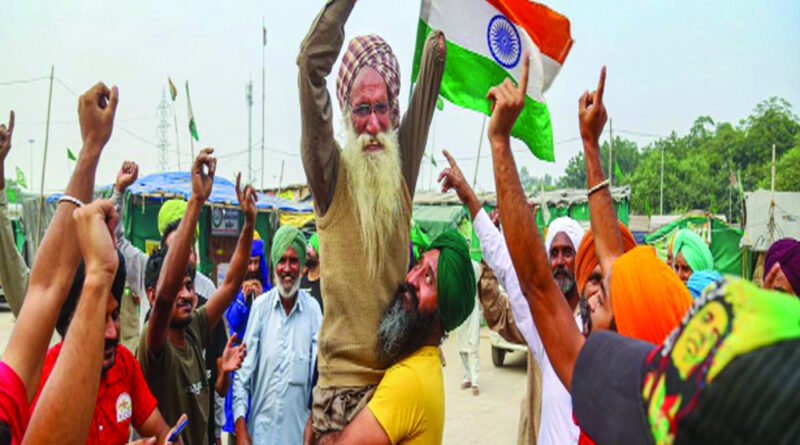Did democracy win or the nation lose?
When a protest based on disinformation triumphs over bold courageous reform, it does not augur well for democracy or the progress of a nation
When on November 19, Prime Minister Narendra Modi unexpectedly announced the repeal of the three farm laws, he coincidentally brought into focus a flaw in our national psyche: a penchant for fuzzy unreal narratives driven by sheer emotionalism as opposed to hard facts and sensible logic.
At the outset the PM’s statement was a straightforward apology; of having failed to convince the farmers of the Government’s good intentions. But in reality, it was far more than the obvious. This abrupt course reversal raised a series of existential questions:
First, were these farm laws so diabolical in their intent and so farmer averse in their construct that annulment was the only option? Or was it a classic case of political chicanery outwitting honest intentions? And did this retreat signal a victory for democracy as some newspapers editorialised?
To begin with, for decades, all political parties have been in agreement that the agricultural industry in India is in dire straits and badly in need of reform. During his tenure, former Prime Minister Manmohan Singh once stated: “There are other rigidities because of the marketing regime set up in the 1930s which prevent our farmers from selling their produce where they get the highest rate of return. It is our intention to remove all those handicaps.“
Accordingly, in September 2020, the Modi Government passed three Bills — the Farmers (Empowerment & Protection) Agreement of Price Assurance and Farm Services Bill, the Essential Commodities Act (Amendment) Bill and the Farmers’ Produce Trade and Commerce (Promotion and Facilitation) Bill.
The Bills would allow greater market play and attract private investment and technology that was needed to better the infrastructure (storage facilities), increase productivity and improve farm incomes.
There has been much debate on the merits and demerits of these Bills and there is near unanimity among experts like Ashok Gulati, the Infosys chair professor for agriculture at ICRIER on the validity and timeliness of these proposed changes.
More recently on July 2, 2021, Sharad Pawar, a former Agriculture Minister and a politician conversant with agricultural issues had called for amendments to the farm bills instead of rejecting them outright.
Failure to implement the farm bills will have serious consequences at the ground level as Ashok Gulati elaborates: “…Cropping patterns will remain skewed in favour of rice and wheat, with the granaries of the food corporation of India bulging with stocks of grain. The food subsidy will keep bloating and there will be large leakages. The groundwater table in the north-western States will keep receding and methane and nitrous oxide will keep polluting the environment. “
So, objectively, devoid of political rhetoric and emotional blackmail (displeasing respected and revered farmers), one can only reach this conclusion: the farm bills had merit and did not deserve to be retracted. Was this really a victory of democracy as claimed by some? The answer is a categorical, no.
Tavleen Singh, writing in the Indian Express (Well Done PM Modi. Nov 22, 2021), sermonised:” In the end it was not about the farm laws but about democracy and the right to protest. Democracy won. The most powerful Prime Minister India has seen for more than three decades bowed to the wishes of the people..”
For one, Modi is no tin pot dictator whose dominance is sustained by the might of an army. His power and popularity are a reflection of the people’s mandate vetted by two successive parliamentary elections. The farm bills were passed as per Constitutional regulations. Therefore, to project this as a standoff between an autocrat and valid public aspirations is an erroneous interpretation of democracy.
Second, protest is an integral part of a democracy and the farmers are justified in their agitation regardless of the virtues of their case. However, when a protest takes a maximalist stance, turns into a violent (Republic Day happenings), disruptive (blockage of highways, rail roko) vendetta with the sole motive of humbling the other party, then it becomes a mobocracy.
More importantly, when a protest based on disinformation triumphs over bold courageous reform, it does not augur well for democracy or the progress of a nation.
The Opposition waltzing with schadenfreude may think themselves as victors, farmers may pat themselves. But the greatest loser is not the BJP or Modi but the nation whose progress has been set back several decades.
The Prime Minister in his wisdom and in his capacity as the ultimate elected leader chose to empathise with the farmers despite their misplaced feelings and withdrew the Bills to defuse the spreading rancor and in the larger interest of the nation (There was a suggestion that external forces might exploit the situation).
But let us not kid ourselves that this was a victory of right over wrong and a triumph of democracy. It was neither.
(The author, a US-based academic and political commentator, frequently writes on current affairs in India.)
Source;




